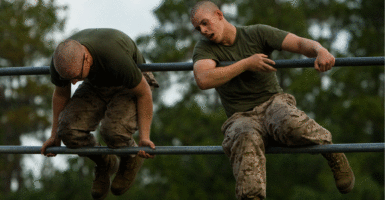A new study says a growing threat to national security doesn’t involve China, Russia, or the Middle East: It’s American obesity.
Of the 7 out of 10 Americans between the ages of 17 and 24 already disqualified from serving in the military, the report found, 31 percent are disqualified because of obesity.
This spells trouble for a military struggling to meet higher recruitment goals.
The study, titled “Unhealthy and Unprepared,” was published last week by the law enforcement nonprofit Council for a Strong America’s “Mission: Readiness” project. The coalition of five organizations says the effort includes more than 700 retired admirals, generals, and other top military leaders whose mission to prepare young people for public service began in 2009.
“Obesity has long threatened our nation’s health. As the epidemic grows, obesity is posing a threat to our nation’s security as well,” the report states. “These ineligibility rates are a major reason why the Army (the military’s largest branch) was not on track to meet its annual recruitment goals as of September 2018.”
The Army announced last month that for the first time since 2005 it will fall 6,500 troops short of its annual recruitment goal, the report says. By the end of 2018, the Army had hoped to attract 76,500 new soldiers.
Though a booming U.S. economy and lower interest in joining among young people are in part to blame, America’s obesity crisis has made it more difficult to meet personnel demands in a military expanding under President Donald Trump and the Republican-led Congress.
“The growing number of Americans unable to join the military, especially those disqualified by reason of obesity, represents a national security crisis,” retired Army Lt. Gen. Thomas Spoehr, who directs the Center for National Defense at The Heritage Foundation, said in an email to The Daily Signal.
Spoehr argued that even as the country’s military lacks adequate equipment such as airplanes and ships, the struggle with obesity represents a greater crisis.
“Equipment is nothing without trained soldiers, marines, sailors, and airmen,” he said.
The United States is the most obese nation in the developed world, with nearly 40 percent of Americans considered obese, according to the Centers for Disease Control and Prevention, a government agency.
“Addressing the obesity epidemic is crucial to maintaining a sufficient all-volunteer force and protecting our nation,” the report from the Council for a Strong America states, and the problem of obesity among young people is getting worse.
U.S. obesity rates largely have remained steady since 2003, but are rising among children and adolescents, and youth are becoming overweight at earlier ages, according to the Harvard T.H. Chan School of Public Health.
“Given the high percentage of American youth who are too overweight to serve, recruiting challenges will continue unless measures are taken to encourage a healthy lifestyle beginning at a young age,” the council’s report states.
The authors—Senior Research Associate Heather Maxey, Research Director Sandra Bishop-Josef, and acting National Director of Mission: Readiness Ben Goodman—argue for enhanced obesity prevention efforts for children and praise the Child and Adult Care Food Program, a Department of Agriculture program that serves nutritious meals and snacks for children in early care and education settings.
“Since the new standards were implemented [in 2010], fruit and vegetable consumption by participating children increased by 16 and 23 percent, respectively,” the authors write.
Defense Secretary James Mattis, a retired Marine general, last month called the shrinking pool of potential military recruits a “big concern” in a speech to cadets at the Virginia Military Institute in Lexington, Virginia.
“It’s a sad state of affairs when 71 percent of 18- to 24-year-old males in this country cannot qualify to enter the United States Army as a private,” Mattis said.
Even those currently serving in the military are starting to gain weight, putting troops at risk of potential injuries.
According to the council’s report, nearly 8 percent of active-duty service members were considered overweight in 2015, a 73 percent increase since 2011.
“Just because an individual is in the military doesn’t mean they are immune from being overweight,” Heritage’s Spoehr said, noting that dining facilities often are loaded with junk food:
Yes, soldiers and others get regular exercise whether they want it or not. But exercise isn’t enough. Diet is even more important in maintaining a healthy weight. And sometimes the military doesn’t make it easy.
For example, when I was in Iraq in 2011, the dining facilities were always generously stocked with ice cream bars, pies, cakes, and waffles. When you are deployed, it’s often hard to make the right food choices, but that is what is needed.
A quote from Thomas Spoehr has been changed to reflect he said regular, not regulate, excercise.
































